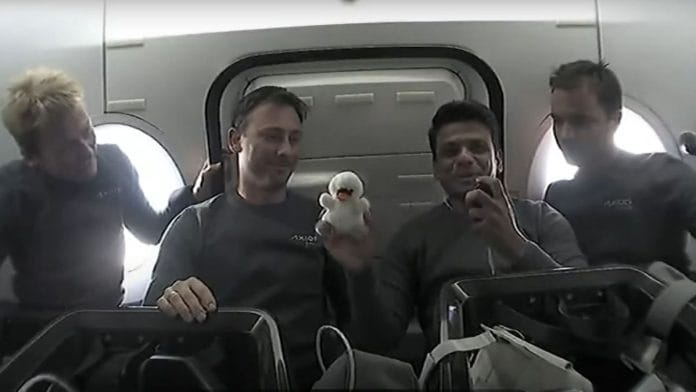New Delhi: Twenty-four hours into their journey to the International Space Station, the Axiom-4 crew, piloted by India’s Shubhanshu Shukla, tuned in for a message to talk about their first time being in Earth’s orbit. The four-member crew, helmed by America’s most experienced astronaut Peggy Whitson, spoke about their spacecraft “Grace” and zero-gravity toy “Joy”, and sent greetings to their respective countries and people on Earth.
“Namaskar from space,” said Shukla, addressing Indians in Hindi. “We launched earlier today from the same landing zone where Apollo 11 had taken off for the Moon. Throughout this flight, I’ve never felt alone and always felt like my country’s people are with me.”
The crew is expected to dock at the ISS at 4.30 pm Thursday, after which they will be welcomed by members on board, and then begin their 2-week-long stay aboard the station. This is India, Hungary and Poland’s first human spaceflight mission in over 40 years, and India’s first-ever trip to the ISS.
“This is the beginning of my journey to the ISS, but it’s also the beginning of India’s human spaceflight programme,” said Shukla in his message. “It is the culmination of not just our technical prowess, but also our hopes and aspirations as Indians, and is a big step towards all our space dreams.”
The crew was travelling over Europe in the Lower Earth Orbit, when they tuned in for the video message. Given the network issues of communicating in space, the Axiom team said they could arrange a call only when the spacecraft was traveling over a ground station. This call lasted 19 minutes, where each crew member spoke about their experience.
“Welcome Earthlings, from Grace,” said Peggy Whitson, commander and the most experienced astronaut on the Mission. “We just wanted to introduce you to our newest Dragon capsule, which we have named Grace. It has the new capsule smell, and it has treated us very well.”
Polish astronaut Sławosz Uznański-Wiśniewski held up the crew’s zero-gravity indicator, a soft toy swan named “Joy”, to talk about the moment when they entered orbit. “When I unbuckled for the first time, and when I looked out the window for the first time, the view was stunning,” he laughed. “We’re going up north now, towards Hungary and Poland. It’s a great moment to be able to see and look back at home, at Europe from space.”
Tibor Kapu, the mission specialist from Hungary, spoke about how “Joy” is not just special to the crew, but also a tribute to Sid, Shukla’s six-year-old son.
“Sid is the only son of the entire crew, he is Shukla’s son and he loves animals. So anytime I look at Joy, I also think of him and the future generations that are to come—and what this moment means to them,” said Kapu.
‘New learning curve’
Shukla, who is one of the astronaut-designates for India’s indigenous Gaganyaan Mission to space scheduled for 2027, said that when they were launching off Wednesday, his one thought was to “just go”. He was referring to the multiple delays and postponements in the Mission, which was originally scheduled for 29 May.
“After 30 days of quarantine, my only feeling was to just go and take off. Then when the ride started, it was amazing—like nothing I’ve ever seen before,” he said.
He joked that his crew members told him he has been “sleeping a lot” since lift-off, and that he was getting used to being in vacuum now. He described the experience as a new learning curve, almost like a baby learning how to eat, breathe and behave in a new environment.
He added that the swan signifies wisdom in Hindu mythology, and therefore it held a lot of meaning for Indians everywhere and him. He also took the time to thank everyone who was a part of the mission, saying that he knew this wasn’t a solo mission, but a culmination of the efforts of everyone involved.
In the same breath, Kapu and Uznański-Wiśniewski also thanked their countries and their people in their native languages.
(Edited by Mannat Chugh)
Also Read: Contact, interlocking & ‘final welcome’. How SpaceX’s Dragon capsule will dock at ISS






